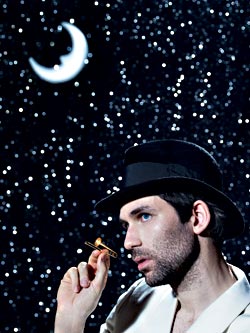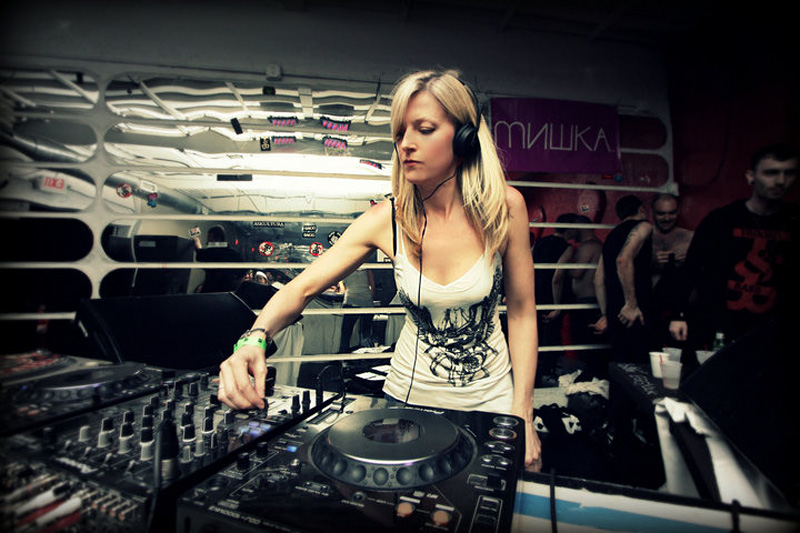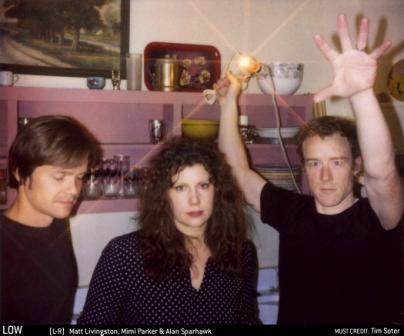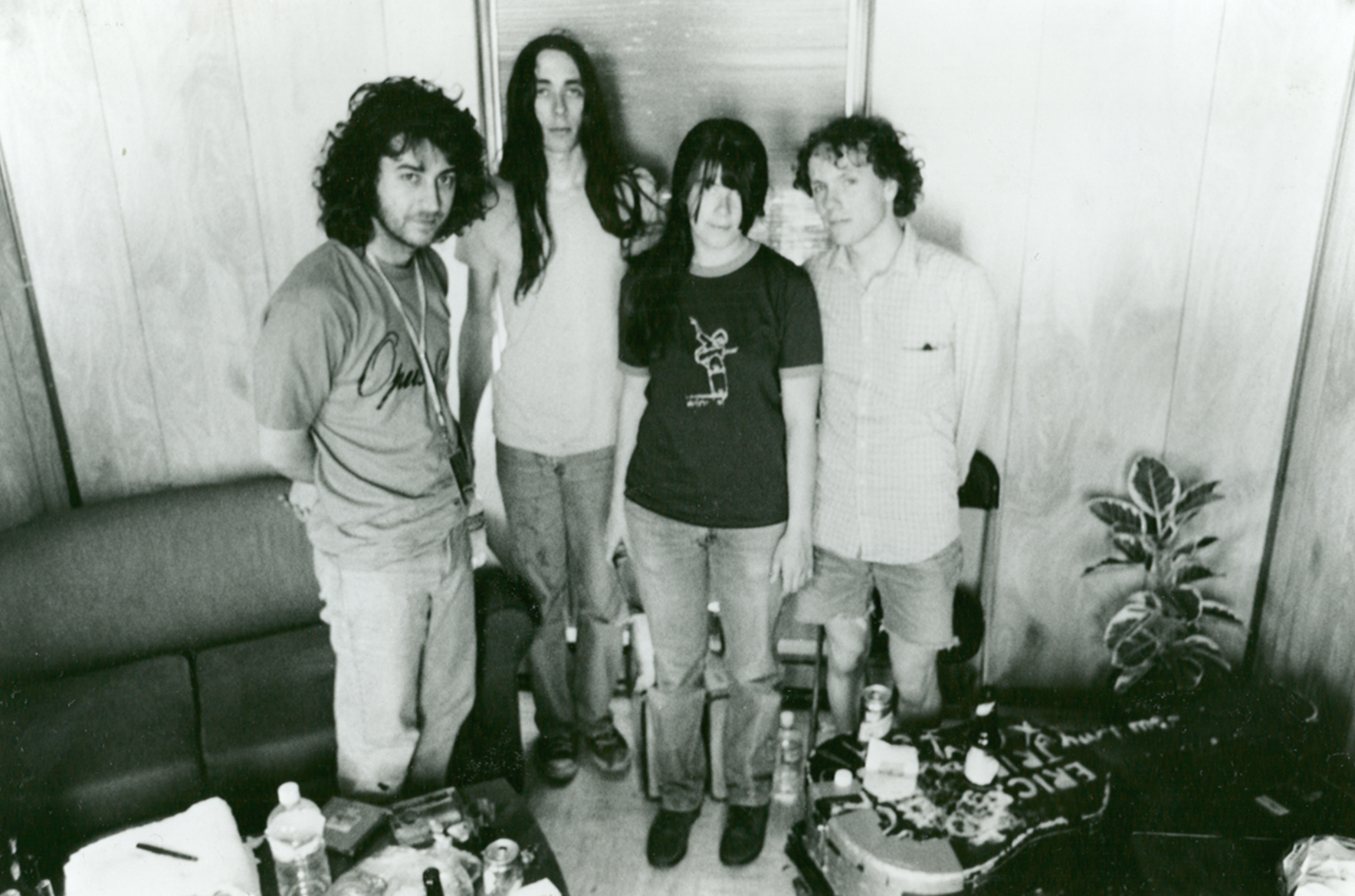Murphy’s Law dictates that if anything can go wrong, it will, and that doesn’t exclude what happens on a working vacation—in this case, Miami’s M3 Summit. Journalists whose digital recorders are full might be forced to use old-fashioned tape, which turns up half-garbled and warped. Performers arriving from Frankfurt might get stuck on the tarmac for five hours, and might get taken away from sun-drenched rooftop parties to chilly hotel lobbies to defend their art to said journalists. That said, my rendezvous with Jamie Lidell during this music industry spring break, excepting his jet lag and my faulty machinery, was mishap-free.
For one thing, I’m not a detractor. Some in the electronic music community haven’t warmed to last year’s Multiply, Lidell’s second solo album for Warp, but they’re in the minority. Those who’ve tracked his path from his days in far-out IDM duo Super_Collider through his sonically absurd solo debut, Muddlin’ Gear, and vocal appearances with Matthew Herbert’s Big Band Project viewed Multiply as a natural step for the adventurous musician. The rest of us were happily blindsided by the electro-soul album of the year. Much has been made of the fact that Lidell, though British, sounds like the reincarnation of Otis Redding, but it’s not a surprising leap. After all, Motown arguably made as much of an impression in the form of Northern Soul as it did in the States, one that’s constantly passed down to new generations of music lovers. What is surprising is the force with which those influences rear their heads on Multiply.
Often performing in spangled clothing or a “media suit” of tape and film, the Lidell I meet is a beach bum–ish alter ego with shaggy hair and striking blue eyes. A slice of lime rests in his melting cocktail while he talks about using R&B as his latest springboard. “I don’t think that for a minute I’m representing a certain thing. I’m definitely a product of my influences, and I guess I wear them on my sleeve in a certain way that some people find weird or offensive,” he says. “You can drive yourself crazy with ‘what am I referencing’ and end up doing nothing—because no one can make anything new. But my intention wasn’t to do something totally retro, either. I think I’ve managed to put enough of my individual stamp on it, while at the same time taking great pleasure in making music with a bunch of people, making a kind of soul style that I love.”
Berlin, where Lidell still lives, set the scene for Multiply, composed with a batch of live musicians and a right-hand man named Mocky. As co-writer and cheerleader, the Canadian-bred musician was indispensable to the project. His support is heard on some of the album’s best tracks, as when Lidell sings, “The first moment you hesitate/Better ask yourself why/Don’t you wait until it’s too late/And something inside has died,” on ballad “Game for Fools,” which features Mocky’s affecting upright bass. “It took about three years for the songs to join together and make an album—thanks to Mocky’s continued efforts to kick my ass,” says Lidell. Though written and recorded at different times and in different headspaces, Multiply‘s songs fuse well as a whole. Some, like “NewMe,” are frenetic blasts of energy rooted in funk, while others, particularly “What Is It This Time?,” betray a bit of existential drama. “I’m often at an emotional crossroads, as we all are, I suppose,” Lidell says. “But it is a kind of venting mechanism for me—making music, getting behind it, and getting it out. Setting it in stone, in a way.”
Lidell likens composing an album to building a sonic statue that complements the ephemeral aspects of live performance. His shows have won raves—even in Seattle, where more outré electronic bookings can be underattended, he reportedly upstaged Four Tet to an approving Neumo’s crowd last fall. With no backing band in tow, Lidell creates the songs live, forming the bed and looping each part with his voice, creating a tantalizing delay for his lyrics to upset. While he doesn’t consider himself a seasoned professional, he aims to make each show a success. “I really need [music] for my sanity and stability emotionally,” he says. “So I hope people get something from what I consider to be a really positive release, and they don’t catch the tail end of me when I’m in a bad mood.” Not likely.
In XLR8R‘s 2005 year-end issue, one industry tastemaker commented that Multiply is “a soul/IDM album even your mom can get down to.” She was right—the day after our interview, I watched Lidell for the first time with my own mom, on the beach at dusk. The only CD in her car is by Mannheim Steamroller, and I have a vague notion that she likes Motown, but that may be a false memory spurred by our love of Dirty Dancing. I curiously watch her reaction to Lidell’s versions of “A Little Bit More,” “When I Come Back Around,” and eventually Multiply‘s crowd-pleasing title track. With each vocal layer Lidell traps and twists in his machine, Mom’s eyes grow incredulously wider, her jaw dropping at the riotous apex of his sonic multiplications. “I think he must be very smart. Do you hear what he’s got going on underneath all that?” she says. “A heartbeat.”








